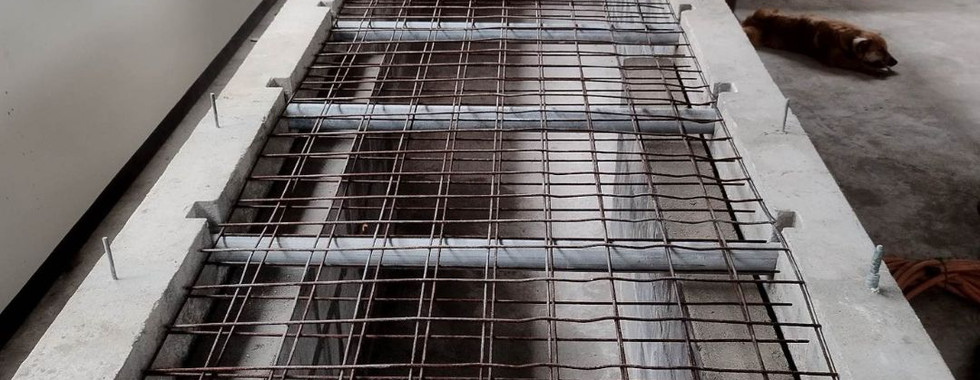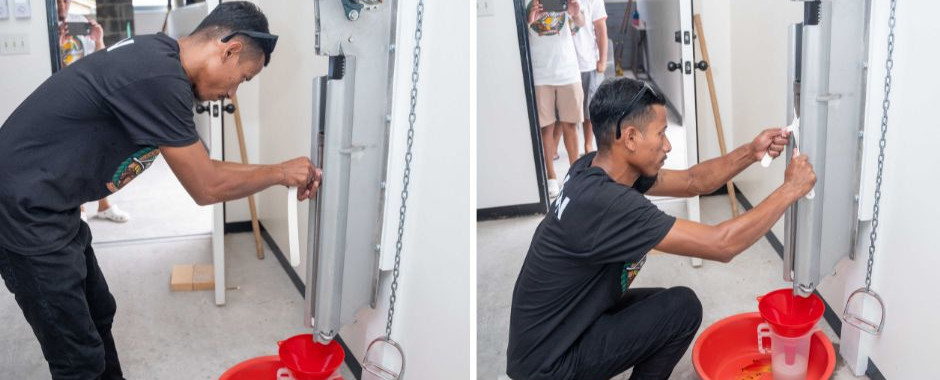Ebon is a coral atoll in the Pacific Ocean forming part of the Marshall Islands. It is the southernmost land mass of the Marshall Islands with a land area of 5.75 square kilometres enclosing a deep lagoon with an area of 104 square kilometres. The RMI Census Report 2021 (Preliminary) recorded a population of 470.

^ Ebon at sunset © Laura Freeman/IOM 2022

^ Ebon Atoll from above retrieved from Google Earth 2023
The community of Ebon, through consultation with the International Organization for Migration (IOM) were interested in expanding production of virgin coconut oil (VCO) as a product to sell both to the local Ebon community and in the urban centre of Majuro, the capital and largest city of the Marshall Islands.

^ Coconut trees on Ebon, © Laura Freeman/IOM, October 2022
Coconuts – the natural resource
Coconuts are one of the few natural resources on the islands that are in abundance, and unlike other archipelagos that can produce an array of local produce, Marshallese farmers are somewhat limited due to the lack of arable soil, and area of land, lack of regular replanting and replenishment of resource through farmer upkeep.
^ Pineep (Body Oil) bottles made by local producers, using traditional fermentation method, for sale in retail stores on Majuro © Laura Freeman/IOM, 2022
For the Marshallese, like most Pacific Islands, coconut oil has many uses. They value it not only for its beautifying properties but also for cooking and medicinal purposes. It is also an attractive product because there are so many other products that can be produced using the oil, and apart from the oil. For example, coconut milk for drinking, shredded coconut for cooking, and soap for washing. The meal produced after pressing oil can be fed to livestock. The coconut shells can be made into charcoal for a healthier smoke-less fuel for cooking, and the husk can be woven into doormats.

^ Official opening of the VCO Direct Micro Expressing (DME) Processing Facility by the Mayor of Ebon, Ebon Ibben Dron, and IOM, © Chewy Lin/IOM, March 2023
Reimaanlok – Looking to the Future
This venture was made possible by the Ridge to Reef (R2R) project, funded by the Global Environment Fund (GEF) administered by the United National Development Programme (UNDP), RMI Climate Change Directorate (CCD), and the International Organization for Migration as lead implementing partner. It was made possible with co-funding from the UNDP Small Grants Programme (SGP), and the New Zealand Embassy in Honolulu through the North Pacific Development Fund (NPDF) who contributed critical funding towards the construction of the facility. The project was carried out in close partnership with the Ebon Atoll Local Government and the newly established Ebon Ibben Dron Cooperative.

^ DME Dryers and the Local Worker Team © Jennifer de Brum/UNDP, May 2023
R2R aims to strengthen natural resource management in atoll communities through integrated approaches that apply the Republic of the Marshall Islands (RMI) National Conservation Area Plan called “Reimaanlok” (looking to the future). This plan provides guidance, employing an eight-step process to support local communities in their journey to conserve their natural environment, and cultural resources.
Data collected through surveys, consultations, and other means, provides a foundation for the development of each community’s Resource Management Plan. This serves as the basis for decision-making, community driven development, donor funding, project interventions, and action on the ground to support their current and future needs.
Funding provided through R2R gives opportunity to plan and implement alternative livelihood projects in support of Step 8 of the Reimaanlock process, which balance both conservation and resource use with income generation. It is a means to develop avenues to make money, in addition to those existing sources such as (in this case) copra production, while also building on existing technical skills, developing new business knowledge, and understanding to be able to better support themselves, their families, and their community.
^ Construction process of the DME Unit Facility, Dryers and equipment © Laura Freeman/IOM April & November 2022
A new livelihood
The consultations with Ebon were with community members of varying ages, location, and background. These consultations and discussions were the first step in the ‘feasibility assessment’ which IOM undertook. The second step focussed on consultation with technical partners and local industry experts who advised on how feasible this livelihood avenue was and how they could further develop VCO at scale, in addition to current household level production and copra, to support community development and diversify valuable local resource use. This is where DME was researched and proposed as an alternative.
The most challenging part of the consultation process was obtaining support and buy-in from the traditional leaders/landowners together with local government leadership. It was a long process of negotiation to secure permission to build the VCO Processing Facility/DME Unit on the land.

^The VCO DME Processing Facility completed © Chewy Lin/IOM, March 2023
Dependence on Copra
Copra has been the backbone of the outer island economies and daily living. It provides for households and is a good way for farmers to make an income. However, income is sporadic and therefore difficult to rely on and plan production for. It depends entirely on when Tobolar Copra Processing Authority (a State-Owned Enterprise) sends a ship through the RMI Marshall Islands Shipping Corporation to come and collect the copra. The ships will visit multiple islands on their voyage (in the case of Ebon the ship travels to Jaluit, Kili, Namdrik and then Ebon Atoll). This can result in farmers not being able to sell all the copra they have, or resorting to the majority of their copra being sold in exchange for items at the local stores in Ebon - which provide for daily needs but may not provide them the return they would get from selling direct with Tobolar (and also means the store owners benefit the most). This especially impacts on the small island community such as Ebon.
Producing copra is laborious and it's a long process with weather being a dependent factor in the drying phase, particularly in Ebon where sunshine hours are low and there is a lot of rain frequenting the Southern Atoll.
^ Ebon copra collection by Tobolar, © Laura Freeman/IOM June 2022
Feasibility of producing virgin coconut oil (VCO)
Producing VCO can provide supplementary earnings for farmers by simply selling their nuts to the Direct Micro Expelling (DME) Unit to be pressed into VCO in exchange for cash. Regular pressing of VCO will increase the demand for these nuts providing a more regular flow of income. This will result in supplementary income and potentially lesser reliance or urgency to produce copra for households across Ebon.

^ Community member of Ebon produces VCO using traditional fermentation method outside her house, © Baren Jordan/IOM 2020
Because of limited natural resources there are few opportunities to generate income. Producing VCO through DME is an exciting prospect and will help in several ways. Currently virgin coconut oil is produced by individual households using traditional methods (fermentation). This only produces VCO in small quantities varying in quality and is therefore not as easy to market and sell, with individual producers from Ebon sending VCO in small 500ml - 1 litre bottles (recycled from water or dishwashing liquid plastic bottles), and getting relatives to sell to friends and at retail stores - with the cash then being sent back to Ebon.
Implementing the DME process as an alternative has provided the opportunity to give jobs, with hourly wage, to small teams of workers, train them in new technical skills, and build financial literacy. DME has given renewed hope to the Ebon community which sometimes experiences an outward migration to urban centres and the United States.
^ Producing DME virgin coconut oil, © Laura Freeman/IOM, January & March 2023
A promising local market
During the feasibility assessment IOM consulted with Tobolar Copra Processing Authority who provided ‘in kind’ technical support and helped with sharing information about understanding the local and international markets for oil. Tobolar among other local beauty and retail businesses have also expressed interest in purchasing VCO from Ebon to use in their own manufactured products and product range.
As their skill and expertise develops, the DME Ebon team are excited about their future in producing and selling virgin coconut oil, and the development of by-products such as soap. They look forward to reporting on their future success.
Photos & content courtesy of IOM, 2023







































































Comments